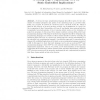8766 search results - page 176 / 1754 » Functional logic programming |
130
Voted
GECCO
2010
Springer
15 years 2 months ago
2010
Springer
To complement standard fitness functions, we propose "Fitness Importance" (FI) as a novel meta-heuristic for online learning systems. We define FI and show how it can be...
226
Voted
POPL
2006
ACM
16 years 3 months ago
2006
ACM
Functional programmers often reason about programs as if they were written in a total language, expecting the results to carry over to non-total (partial) languages. We justify su...
145
Voted
ASP
2003
Springer
15 years 8 months ago
2003
Springer
Abstract. We integrate an expressive class of description logics (DLs) and answer set programming by extending the latter to support inverted predicates and infinite domains, feat...
139
Voted
ECSQARU
2005
Springer
15 years 8 months ago
2005
Springer
Abstract. Both in classical logic and in Answer Set Programming, inconsistency is characterized by non existence of a model. Whereas every formula is a theorem for inconsistent set...
114
Voted
FOSSACS
1999
Springer
15 years 7 months ago
1999
Springer
Abstract. A strong (L) logic programming language ([14, 15]) is given by two subclasses of formulas (programs and goals) of the underlying logic L, provided that: firstly, any pro...

